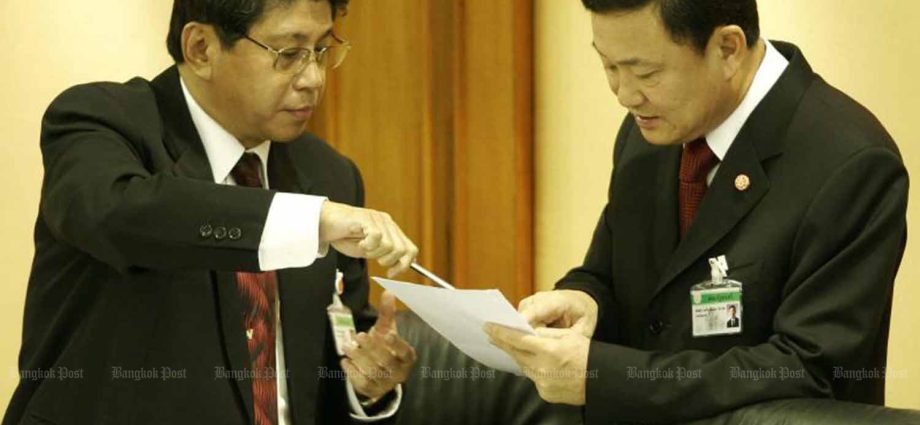Former PM could seek pardon right away but if it’s refused, he must wait two years to apply again

Fugitive former prime minister Thaksin Shinawatra will go to jail when he returns to the country, according to Wissanu Krea-ngam, deputy prime minister and acting justice minister.
Mr Wissanu discussed procedures for Thaksin’s return in response to an announcement by Thaksin’s daughter Paetongtarn that he would arrive at Don Mueang airport at 9am on Tuesday.
It was the latest of innumerable announcements in recent months about a possible homecoming, but Ms Paetongtarn insists that this one is for real.
Although the government has not been informed officially about the planned return, officials had already made detailed preparations to receive Thaksin in response to earlier reports, Mr Wissanu said on Saturday.
Senior police and officials from the Corrections Department, the Immigration Bureau and the Metropolitan Police Bureau conferred again on Friday to confirm how they intend to handle the high-profile arrival.
When Thaksin lands at Don Mueang, he will be subject to the normal legal action and procedures for any people of similar status, Mr Wissanu said.
Thaksin would be served with an imprisonment order by the Supreme Court’s Criminal Division for Holders of Political Positions. Then corrections officials would bring him to the Corrections Department and the Klong Prem Central Prison in Chatuchak district of Bangkok, the deputy prime minister said.
Before entering the prison, Thaksin would undergo a physical checkup like other inmates, Mr Wissanu said. He was uncertain if Thaksin’s family members and relatives would be able to meet him in the prison right away.
It has been speculated that Thaksin will immediately seek a royal pardon, and that he would not be returning to the country unless he had assurances that his request would be treated favourably.
Mr Wissanu confirmed that Thaksin could seek a royal pardon or others could seek it on his behalf. However, if the request is turned down, he would have to wait two years before resubmitting it. During the two-year-long wait, he would remain imprisoned, Mr Wissanu said.
Reporters asked whether authorities had other concerns, given that parliament is scheduled to vote for a prime ministerial candidate from the Pheu Thai Party just hours after Thaksin arrives.
Mr Wissanu, who served under Thaksin as a deputy premier 20 years ago, replied that he was uncertain if his former boss would really return on that day.
Pheu Thai is the third incarnation of the Thai Rak Thai Party that Thaksin founded more than two decades ago. Despite repeated protestations by the party, he is still its chief strategic thinker, judging by the number of flights senior Pheu Thai members and representatives of other parties take each year to visit him in Dubai, Hong Kong and elsewhere.
Pheu Thai is expected to nominate former property tycoon Srettha Thavisin for prime minister when parliament meets. However, Thaksin’s daughter Paetongtarn is also a prime ministerial candidate of the party.
Since being overthrown by a military coup on Sept 19, 2006, Thaksin has been living in self-imposed exile, except for a brief visit to the country in 2008. During his absence, the Supreme Court’s Criminal Division for Holders of Political Positions sentenced him to a total of 12 years in prison in four cases.
In the first case, Thaksin was found guilty of abuse of authority over the purchase by his then-wife Khunying Potjaman na Pombejra of state-owned land in the Ratchadaphisek area of Bangkok at a price below the market value, resulting in a two-year prison sentence. The 10-year statute of limitations on the court ruling expired in October 2018.
The second case led to a two-year prison sentence for the fugitive former prime minister, as he was found guilty of malfeasance in connection with the two- and three-digit lottery case.
In the third case, Thaksin received a three-year prison sentence for abusing his position by authorising 4 billion baht in loans to Myanmar through the Export-Import (Exim) Bank of Thailand. The funds were used to purchase equipment from the telecoms firm owned by his family.
The fourth case resulted in a five-year prison sentence, as the court found him guilty of using nominees to hold shares in Shin Corp, a telecommunications company, which is prohibited for any political office holder.
The statutes of limitations for the court decisions on the second, third and fourth cases have not expired.
Earlier Mr Wissanu confirmed that the combined jail term for Thaksin was 10 years.

